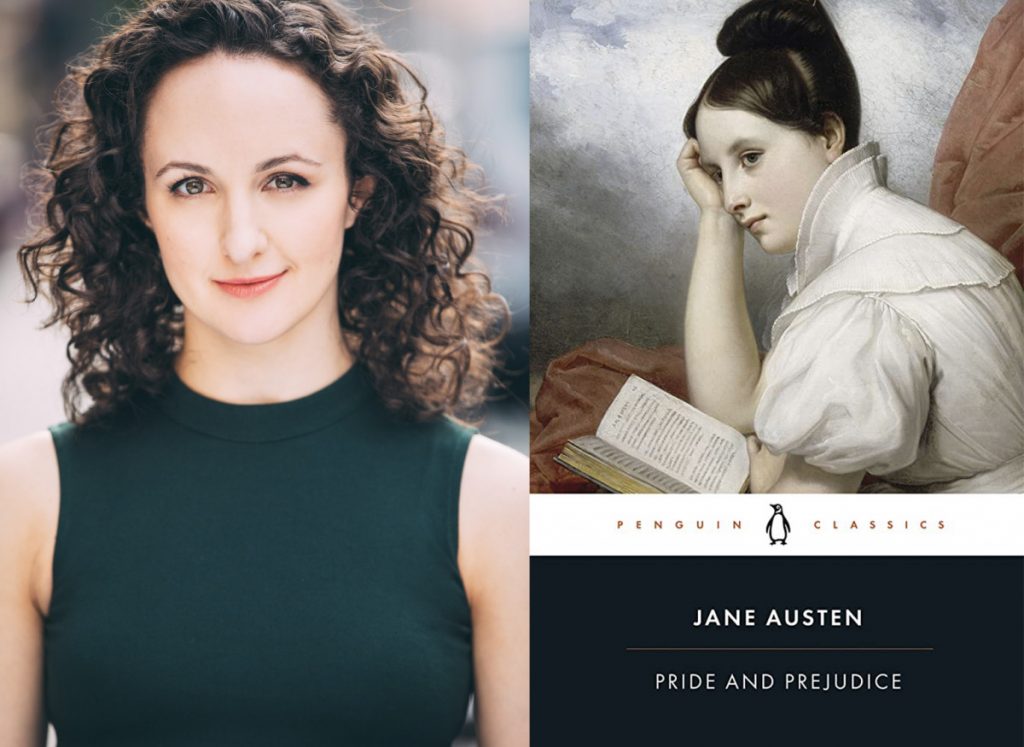
Kaitlyn Finchler
Staff writer
Classics are seen as cultural touchstones, at least to actor and playwright Kate Hamill. With “hero” or “protagonist,” people automatically have a set of characteristics in their mind when these words are used.
Following Chautauqua Theater Company’s run of Hamill’s adaptation of Pride and Prejudice, she’ll present Jane Austen’s book as one of Week Six’s Chautauqua Literary and Scientific Circle selections at 3:30 p.m. today in the Hall of Philosophy.
“I’m really interested in creating highly theatrical, inclusive, feminist, female-centered stories,” Hamill said, “(ones) that re-examine, ‘Who is a protagonist?’ and what it means to be a hero. … That has the capacity to move a lot of the culture forward.”
This is a “really important moment” for theater, specifically in America, she said. Theaters are in “a bit of an existential crisis” though they provide an ancient, cathartic art.
“It’s a form that offers communities a chance to come together and have real-world dialogues in a way you just can’t have with your TV (or computer) screen,” Hamill said.
In 2017, Hamill adapted Pride and Prejudice for the stage, putting a modern spin on the original’s still-relevant themes of feminism, independence, love and marriage — or, fear of marriage.
With the Chautauqua Lecture Series theme, “A Life of Literature,” the CLSC is using Hamill’s adaptation to point to the theatrical side of literature.
“Plays are the best way to show what the work of literature is, because it connects so well with the other mediums,” said Sony Ton-Aime, the Michael I. Rudell Director of Literary Arts. “(Hamill) is taking the word from the page and making it something that is more than the performance.”
By adapting Pride and Prejudice for a contemporary audience, Ton-Aime said Hamill’s spin on the book makes it relevant yet “humble,” the “perfect example” of a life of literature.
“I would like (the audience) to be interested in the ways that they can engage with theater in their own community,” Hamill said, “in which they can keep kicking down the doors of these old stories and letting them run around in the sunlight.”
Hamill said she wanted to “break the story open” from previous adaptations that were “dramaturgically faithful or rigid” in nature.
“We treat romantic love as sort of a cross between a game and a war,” she said. “My now-husband and I were approaching the idea of marriage and I had, historically, been frightened at the idea of marriage.”
Her adaptation examines how “high stakes” finding a life partner can be. Hamill said she often looked back and thought about farce — a ridiculous, extremely emotional experience.
Lizzy Bennet, the protagonist of Pride and Prejudice, is someone who is “large and sunny, and has very much her own opinion on things,” Hamill said.
She has portrayed Bennet twice, and said it’s a “really interesting social commentary” prompting audiences to re-consider preconceived notions or judgments.
“I cast myself as Lizzy initially because I was very much at that place in my life where I was scared of marriage and also examining marriage,” she said. “I used that play as a cathartic moment to become quite happily married.”
Although Pride and Prejudice offers a feminist take on society, Hamill said theater can stand to be “a lot more” feminist. In a country where there’s a “real anti-feminist, anti-MeToo and certainly an anti-choice backswing,” it’s actually incumbent for theater to do so.
“(Theaters should be) interested in exploring humanity’s laws and foibles and strengths, and also moving the dial on cultural change and being part of a cultural conversation,” she said.
She appreciates women in theater working toward this change, like CTC Producing Artistic Director Jade King Carroll, who helmed CTC’s production of Pride and Prejudice.
“I’m super encouraged by leaders like Jade at Chautauqua and other leaders who are really interested in telling extremely inclusive stories,” Hamill said. “We’re at a real cultural tipping point right now, and it’s important that theaters be on the right side of that fight.”




